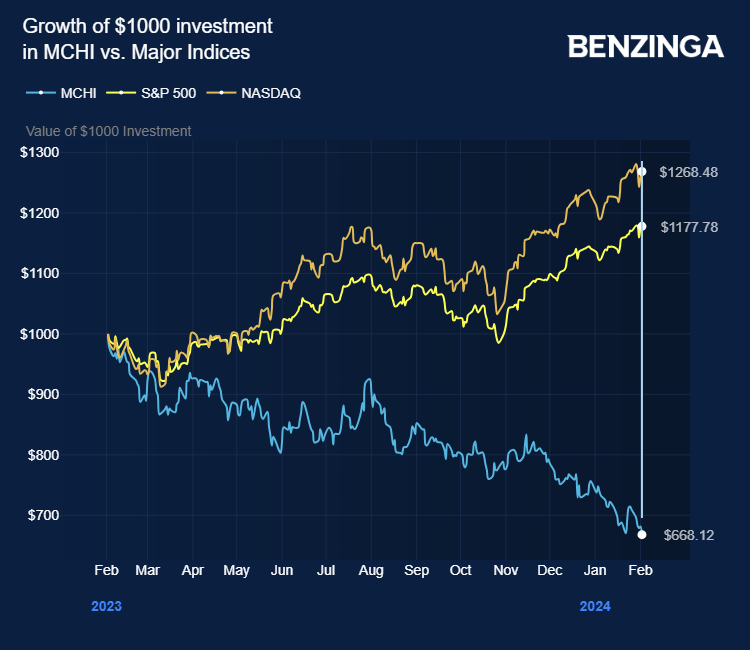Zinger Key Points
- Alibaba limits losses, but reports Q4 earnings next week
- CSI 300 index falls to five-year low
- Feel unsure about the market’s next move? Copy trade alerts from Matt Maley—a Wall Street veteran who consistently finds profits in volatile markets. Claim your 7-day free trial now.
Mainland China stocks slumped again on Friday, with the Shanghai Composite having its worst week in five years, while the CSI 300 index slumped to a five-year low.
Shares listed on Hong Kong’s blue-chip index fared a little better, but were still down on the week, with the Hang Seng falling 2.6% over the five trading sessions.
But mainland indexes fell more precipitously. The Shenzhen Composite fell 8.1% over the week to a five-year low, while the Shanghai Composite slid 6.2% to a four-year low.
The iShares MSCI China ETF MCHI, an exchange-traded fund that tracks the performance of China’s top stocks, fell 5.5% over the week.

Also Read: China Market Collapse Resumes As Government Fails To Put Brakes On Stock Dump
China Economic Challenges
Mohamed El-Erian, chief economic adviser at Allianz, said in a post on X: “This financial volatility amplifies the economic challenges facing China, including efforts both to pivot to a higher ‘quality growth’ policy stance and to manage and deflate excess debt bubbles.”
Growth in China has slowed rapidly from its “tiger economy” years in the 1990s to 2010s, when double-digit growth was built upon rapid industrialization and manufacturing, bringing its largely rural population into cities and sparking a two-decades-long property boom.
The government, as El-Erian suggested, is now striving for more balance between manufacturing and services in its economy, while also supporting a property sector on the verge of collapse.
On top of this, it is also adding regular doses of extra liquidity and other monetary stimulus efforts to prop up the sinking equity market as investment cash floods out of the country.
Confidence Falling Along With Top Stocks
These efforts, however, have proved insufficient as investor confidence spirals lower, taking some of China’s biggest names with it.
Over the week, some of the biggest names in Chinese technology and property were down, with tech company Lenovo LNVGY down by nearly 14% on the Hang Seng Index.
Alibaba BABA, which presented its fourth-quarter earnings on February 7, managed to limit its weekly losses to 0.3%, but e-commerce rival JD.com JD fell 6%.
Alibaba’s shares have fallen by a third over the past year, however, as increased competition from rivals such as JD.com and PDD PDD take market share.
In dollar terms, based on its U.S. listing, Alibaba is expected to report fourth-quarter earnings of $2.73 per share, down 2.2% from the same quarter a year ago.
Also, among the big tech plummets, was SMIC, China’s biggest semiconductor manufacturer, which fell 9.5% over the week, and BYD BYDDY, the electric vehicle manufacturer.
Longfor Properties LGFRY saw the biggest faller in the real estate sector, down nearly 8% over the week.
Image: Shutterstock
Edge Rankings
Price Trend
© 2025 Benzinga.com. Benzinga does not provide investment advice. All rights reserved.
Trade confidently with insights and alerts from analyst ratings, free reports and breaking news that affects the stocks you care about.